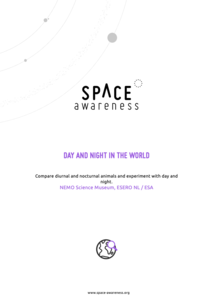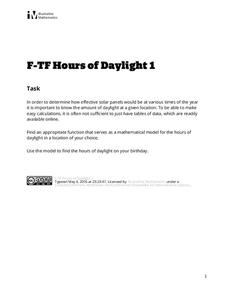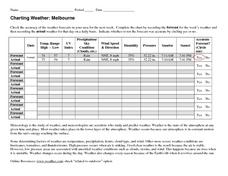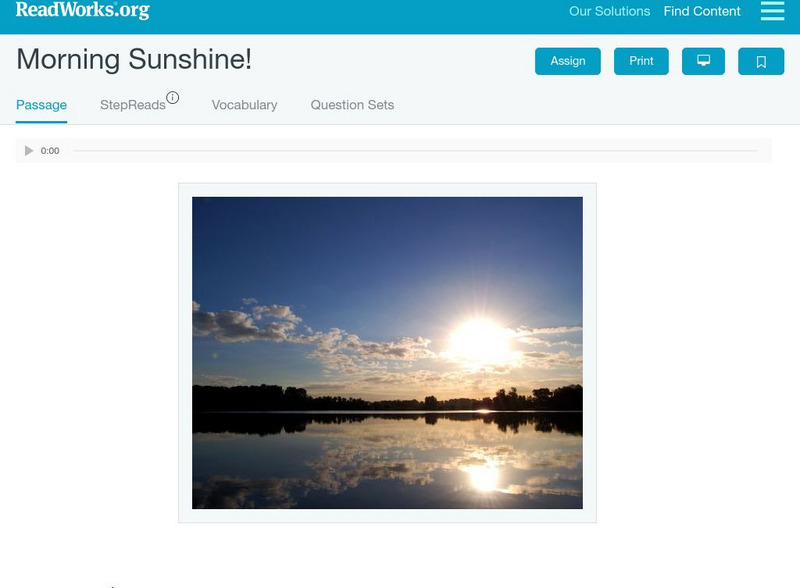Space Awareness
Day and Night in the World
How do different parts of the world experience day and night? Introduce scholars to the concept of global citizenship while teaching about animal behavior with discussion of nocturnal and diurnal animals. Then, learners complete...
Magic of Physics
Shadows
Sunrise, sunset ... swiftly move the shadows! Pupils practice comparing shadow length data with a hands-on activity. The resource allows users to examine and measure the shadow cast by a stick as the sun moves overhead before testing...
Illustrative Mathematics
Hours of Daylight 1
The midline of the mathematical model of the number of hours of sunlight is not 12 hours. Pupils use the modeling cycle to determine a function that will model the number of hours of sunlight at a location of their choosing. Using...
Curated OER
Season Worksheet #5
Sunrise, sunset, swiftly fly the years! Your earth scientists can also fly through a year of daylight data. They analyze a graph and then answer five multiple choice questions about the rising and setting of the sun, the total number of...
Curated OER
What Goes Up Must Come Down!!
Fifth graders look at actual sunrise and sunset times for their hometown to determine a pattern in the amount of daylight. They collect their data in Excel and create a chart to help them identify the pattern, then write an explanation...
Curated OER
Arctic Days Record Sheet
In this sunlight worksheet, students record the amount of daylight, sunrise time, sunset time, and average temperatures for the 21st day of each month. Students fill out 60 boxes total.
Curated OER
The Earth's Rotation
Young scholars see a model of a globe to watch the Earth rotate. In this Earth lesson plan, students rotate the globe and shine a flashlight to see where the sun shines and how it rises and sets. They create a diagram and explain day and...
Curated OER
Charting Weather: Melbourne
In this earth science worksheet, students check the accuracy of the weather forecasts in their area for a week. Then they complete the chart by recording the forecast for the week's weather and then recording the actual weather for that...
Curated OER
Sunrise, Sunset: Apparent Motion of the Sun
Students discuss the meaning of a day and what happens to the sun as it turns to night. Then they go outside and draw the view in front of them, paying close attention to the location of the sun. Every hour they return and chart the...
Curated OER
DASH Sunrise and Sunset/ Seasons Chart
Second graders rotate as the person to enter the information of sunrise and sunset into a spreadsheet. The teacher also demonstrates how to convert the spreadsheet into a chart.
Curated OER
Tracking Sunrise and Sunset
Young scholars collect, record, and graph the sunrise and sunset times. They explain how the relationship between the tilt of Earth's axis and its yearly orbit around the sun produces the seasons.
Curated OER
Sunrise/Sunset
Pupils apply data from a weather-related website to predict patterns in the sunrise and sunset.
Curated OER
Sunrise and Sunset - Graph of Daily Solar Radiation
Students use a graph of daily solar radiation to determine the times of sunrise and sunset. They also compare how sunrise, sunset, and the length of the day changes with latitude and longitude.
TeachEngineering
Teach Engineering: Portable Sundial
In this activity students will investigate the accuracy of sundials and the discrepancy that lies between "real time" and "clock time". They will track the position of the sun over the course of a relatively short period of time as they...
Beacon Learning Center
Beacon Learning Center: Sunrise Sunset
Reading a story about a trip taken by a girl and her dad, this interactive resource teaches kids about the motion of the sun during the day. Occasional questions probe their understanding of this process. They are asked to predict where...
E-learning for Kids
E Learning for Kids: Science: Center of the Ocean: The Sun, the Earth, and the Moon
Nita lives on Coco Island in the Indian Ocean, and is learning more about the Sun, the Earth, and the Moon. Join her and learn about day and night.
E-learning for Kids
E Learning for Kids: Science: Egypt: Why Does the Sun Appear to Move Across the Sky?
Join Imhotep in his journey to figure out where the sun goes at night.
PBS
Pbs Learning Media: Sunrise or Sunset?
What difference does a sunrise or sunset make in your mood and which one do you prefer?
University of Illinois
University of Illinois Urbana Champaign: Ww2010: Sunset Colors
This site examines the optics of the atmosphere and explains why we see different colored sunsets.
Science Education Resource Center at Carleton College
Serc: Creating Your Own Sunset
Students observe a physical example of how the sunrises and sunsets show color in the sky.
Read Works
Read Works: Morning Sunshine
[Free Registration/Login Required] Students read about how the tilt of the Earth on its axis affects sunrises and sunstes. A question sheet is available to help students build skills in reading comprehension.
Read Works
Read Works: Sunrise, Sunset, or Not?
[Free Registration/Login Required] An informational text about what causes the sunrise and sunset. A question sheet is available to help students build skills in reading comprehension.
Math Is Fun
Math Is Fun: Sun Clock
The mathematics resource discusses the sun clock. Students review the concept using the provided notes and then answer questions to check for comprehension of the topic.























